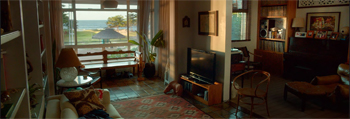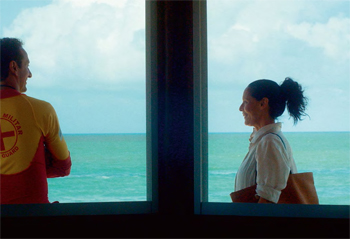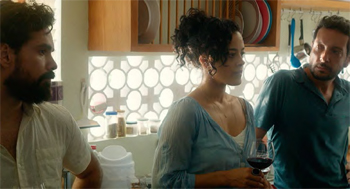Kleber Mendonça Filho Aquarius Interview

Kleber Mendonça Filho Aquarius Interview
Cast: Sonia Braga, Maeve Jinkings, Irandhir Santos
Director: Kleber Mendonça Filho
Genre: Drama
Running Time: 142 minutes
Synopsis: Clara, a 65 year old widow and retired music critic, was born into a wealthy and traditional family in Recife, Brazil. She is the last resident of the Aquarius, an original two-story building, built in the 1940s, in the upper-class, seaside Boa Viagem Avenue, Recife. All the neighboring apartments have already been acquired by a company which has other plans for that plot. Clara has pledged to only leave her place upon her death, and will engage in a cold war of sorts with the company. This tension both disturbs Clara and gives her that edge on her daily routine. It also gets her thinking about her loved ones, her past and her future.
Aquarius
Release Date: February 23rd, 2017
Trailer
Interview with Kleber Mendonça Filho
Question: Where did this project begin? What triggered the story?
Kleber Mendonça Filho: I started out wanting to make a movie about archives, and Aquarius may yet prove the first step on the road to a movie about the predilection for keeping objects and the divergence between documents and memories. I found it interesting to have as my protagonists a person and a building that are roughly the same age and both in some way under threat. The film emerged out of a series of events, including a fairly mundane glut of telephone calls I received at home"cold calls selling all kinds of subscriptions for credit cards, health insurance, cable TV or newspapers. I felt under attack from the market, which attempts to force people to buy things that they don't want.
Question: Starting with this idea of being under attack from the market, the film is a direct, though subtle commentary on the wave of property speculation that hit Recife in recent years. Rather than approach the problem in an overtly political way, you choose to focus on the psychological impact on regular citizens.
Kleber Mendonça Filho: Yes, the pestering I have just described is particularly aggressive in relation to the property market. Before the recession hit Brazil, they behaved like ravenous beasts. The ballet of excavators and bulldozers that I witnessed in Recife was depressing, as well as fascinating. I recall observing the evolving destiny of a house and its owners. Having seen the occupants move out, I saw a sign go up one day, announcing the construction of a new building. A few months later, I got home to find a bulldozer clearing the land where that house had stood for decades. It had taken barely a few hours to demolish it. I like to apply this process to my films, testifying to change through a viewpoint linked to an individual life. And so, in Aquarius, little by little, Clara grasps what is happening to her space and her personal environment.
Question: This confrontation turns out to be a conflict between different lifestyles: on the one hand, ultra-contemporary living, marked by conspicuous consumption and widespread sanitization; on the other hand, that of an earlier generation, based on «getting along» and a sense of community. Is this a conflict that affects you?
Kleber Mendonça Filho: Clearly, the tension it creates is important for the movie, but in my own life I take this conflict with a blend of serenity and irritation. How can they casually demolish so many houses and buildings that have a story, that are reference points for so many people? In Recife, the city has been completely reshaped in its modus operandi by the demands of the market, and nothing has been done to protect the city from commercial interests. I always hear people saying Brazil is a young country without the same bond to history that you see in Europe, for example. It's absurd because a town like Recife, which dates back five hundred years, has a long history. Property speculation seems to have succeeded in destroying whole swathes of a number of Brazil's major cities by offering new constructions that adhere to a specific design and promote an idea of renewal simply by erasing anything «old.» In the end, with Aquarius, we come back to the idea of a film about archives, whether they be material or emotional.
Question: Your previous movie, Neighboring Sounds, also featured the attentive construction of a complex microcosm with its web of friendships and alliances. Does this allow you to approach political, social and historical issues specific to Brazil?
Kleber Mendonça Filho: I don't think it's possible to depict life and day-to-day events without highlighting their contradictions, whether they are thought-provoking, amusing or sinister. When I'm writing a film, it's difficult for me to ignore these aspects of society, and Brazilian society in particular. I have always been struck by the ideological contradictions of Brazilians from the wealthier social classes: they can have an aristocratic attitude, while supporting abolitionism and leftwing values. The fundamental challenge for me is to depict this society in all its complexity.
 Question: The aggressive methods of contemporary management, based on emotional manipulation and potentially extending to psychological harassment, are deployed almost metaphorically in the movie, in a variety of indirect offensives that verge on the absurd. Gradually, a detachment from reality occurs, and we have to wonder if this nightmare is not all in Clara's head.
Question: The aggressive methods of contemporary management, based on emotional manipulation and potentially extending to psychological harassment, are deployed almost metaphorically in the movie, in a variety of indirect offensives that verge on the absurd. Gradually, a detachment from reality occurs, and we have to wonder if this nightmare is not all in Clara's head.
Kleber Mendonça Filho: First of all, Clara's nightmare is very real. She sees herself alone and in a very uncomfortable situation, subjected to strong pressures merely for being home, in the building where she has always lived. She has this impression that somebody has suddenly decided her space is valueless, outdated and must be gotten rid of. With so many opinions against her, even within her own family, Clara occasionally feels like she is losing her mind. She is mentally vulnerable, which opens the door to unnerving feelings. I like the idea that this leads us to mystery and doubt, like a lucid nightmare.
Question: Your flirtation with fantasy and genre movies occasionally rears its head, with scenes that create genuine fear, although we can't identify its origins or the reason for it.
Kleber Mendonça Filho: To some extent, Aquarius brings to mind a siege movie with no shooting, bows and arrows, or Molotov cocktails. Not literally, at least. The Aquarius building and Clara's apartment are defined spaces"doors, walls, courtyard"and face the imminent risk of invasion. The building is constantly violated, and the apartment, the most intimate part of this environment, is threatened. The open windows contribute to this feeling, playing a fairly classical role in my eyes, that of exterior/interior. There is also the unfortunate fact that in Brazil, open windows remind us of the custom of putting barriers of some kind or another across every window, whatever the floor, to prevent breaking-and-entering. I think that all these aspects of the film are very ordinary and conventional, but there must be something in the framing and cutting that reinforces this apparently fantastical tone.
Question: Was Clara, played by Sonia Braga, always the focus of the story?
Kleber Mendonça Filho: From the start, the fulcrum of the film was this woman in her sixties, a widow who owns a very beautiful and simple apartment in an old building. I was never tempted to interweave events at the property developer's offices, or to show Diego, the young entrepreneur, in his private life or in meetings with his staff. As soon as I started writing, the film was devoted to Clara. We had to be with her and the viewpoint, most of the time, is hers. Any contact with other people occurs through her because they knock on her door or talk to her, or because she addresses someone. Sticking close to Clara is what allows us to generate a sense of insecurity or danger.
 Question: How did the idea of Sonia Braga playing Clara emerge? Did you write the film with her in mind?
Question: How did the idea of Sonia Braga playing Clara emerge? Did you write the film with her in mind?
Kleber Mendonça Filho: No. When I was writing, I envisioned finding an unknown who could play Clara. We were in pre-production, when Pedro Sotero (the film's co-director of photography) suggested Sonia Braga. Our casting director, Marcelo Caetano, sent the script to Sonia in the US. Within 48 hours, she replied, saying she wanted to do the movie. I went to New York to meet her, and she was fabulous. One of the most wonderful things in all this is that Sonia had been part of my life, as is often the case with great artists, and she became someone I worked with, and now a friend also.
Question: For many people, due to her playing a number of sexually liberated women, Sonia Braga is a sex symbol. Was her public image a factor in the development of the character?
Kleber Mendonça Filho: I never really thought about Sonia the «sex symbol» because for me, more than anything else, Sonia is an instantly recognizable face of Brazilian culture, and her image is one of unforgettable beauty. I was very interested to involve this star in a realistic dramatic situation, where her beauty is called upon and contributes to some extent to the story.
Question: Music plays a very important role in the film, modulating Clara's different states of mind and eventually becoming a character in its own right. How did you develop this dynamic relationship between the storytelling and the various musical styles that feature in the film?
Kleber Mendonça Filho: I like the fact that Clara has LPs at home"those she bought over a period of forty years, or those sent to her while she was working as a critic. I also like the idea that, even though she has a vinyl collection, she doesn't refuse to listen to tracks on her phone. It was only natural, since she listens to music, for music to occupy scenes. Music also gives an indication of her tastes and moods.
Q uestion: The film takes its title from the name of the building, reinforcing the idea that the story is rooted in the location. How would you define your relationship to space as a filmmaker?
uestion: The film takes its title from the name of the building, reinforcing the idea that the story is rooted in the location. How would you define your relationship to space as a filmmaker?
Kleber Mendonça Filho: For me, the question of space is linked to the quantity of information one wants to get across through shot selection and framing. From the beginning, the building was a character in the movie; the challenge for me was to subtly present it as having a kind of dignity. It is a slightly older building, already doomed, but it was important that it should not seem rundown or hazardous. In other words, it is innocent of any crime. It must be clear in the film that its problems come from the outside, not from within, from the structure itself. Similarly, in a kind of game with the audience, we had to show Clara's apartment in sufficient detail for people to be able to sketch its layout after seeing the film. Shooting in a real apartment certainly helped me to think about the space itself and its constraints. The demands of a movie, such as camera angles and the use of doors and windows, pose a series of concrete problems that reveal to us new ideas about real space and cinematic space.
Question: The film's ending will surprise audiences. Can you comment on your choice in this respect?
Kleber Mendonça Filho: I'd written two other endings, but I didn't shoot them. They were interesting but the style was closer to a sense of «wrapping up the story» – conflicts were more or less resolved and we had a pretty good idea of what had happened or not. Sometimes, you are captivated by a film and its artistic personality, but then the ending feels like all the loose ends being tied up and nothing else. It's no tragedy because a lot of these endings work fine. It's just personal disappointment. There is another type of ending, however, which is more difficult to explain or even accept, and which doesn't try to answer every question. Something abruptly happens and the film ends. I always think back to the ending of The Texas Chainsaw Massacre (Tobe Hooper, 1974), with Leatherface brandishing his roaring chainsaw in a demented ballet as the sun sets behind him. The ending leaves lots of questions open: we don't follow the girl who manages to escape; the police don't arrive on the scene; no ambulances appear; the chainsaw doesn't run out of fuel... But it's an ending that is very effective with its final hard cut to black. In the case of Aquarius, it was a decision we made in editing because we felt that the final scene represented a major dramatic leap for Clara with regard to the story. Besides, I love those last three shots and their relationship to the opening shots of the movie.
Interview by Tatiana Monassa
Aquarius
Release Date: February 23rd, 2017
MORE
- Mission: Impossible Fallout
- Glenn Close The Wife
- Allison Chhorn Stanley's Mouth Interview
- Benicio Del Toro Sicario: Day of the Soldado
- Dame Judi Dench Tea With The Dames
- Sandra Bullock Ocean's 8
- Chris Pratt Jurassic World: Fallen Kingdom
- Claudia Sangiorgi Dalimore and Michelle Grace...
- Rachel McAdams Disobedience Interview
- Sebastián Lelio and Alessandro Nivola...
- Perri Cummings Trench Interview




